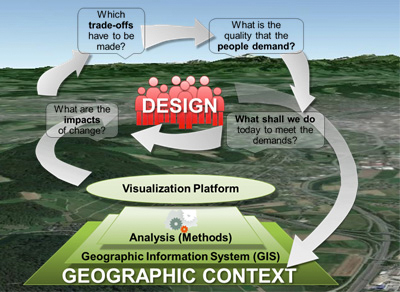
Städte und Agglomerationen sollen qualitativ hochwertigen Lebensraum für ihre Bewohnerinnen und Bewohner bieten. Dieses Ziel zu erreichen, ist nicht leicht. Adäquate Planungsansätze müssen das komplexe sozio-ökologische System von urbanen Landschaften mit einbeziehen, denn urbane Gebiete haben einen wesentlichen Einfluss auf das Funktionieren der Biosphäre auf allen Massstabsebenen. Die Belastbarkeit und Widerstandsfähigkeit des Systems, also seine Resilienz, sind wichtige Kriterien für eine zielführende Planung. Kollaborative Lernprozesse, die mit wissenschaftlichen Methoden unterstützt werden, können praktikable Ansätze für mehr Resilienz in der Planung sein.
Baulücken nutzen, Industrieareale umnutzen oder die Ausnützung erhöhen verändern Siedlungsmuster. Dies hat auf unterschiedlichen Massstabsebenen vielfache und miteinander verknüpfte Auswirkungen auf sozio-ökonomische und ökologische Aspekte. Wissenschaftliche Methoden zur Analyse dieser Auswirkungen werden in der Planungspraxis jedoch kaum eingesetzt. Unerwünschte Effekte, wie potentiell steigende Wohnungspreise und Gentrifizierung oder ungenügende Flächen für Erholung und Artenvielfalt, können in der Planung unentdeckt bleiben. Wichtig sind deshalb disziplinen- und massstabsübergreifende Kollaborationsprozesse von Wissenschaft und Praxis, in denen ein umfassendes Verständnis von Wechselwirkungen der raumwirksamen Faktoren erlangt wird.
Doch wie können kollaborative Lernprozesse organisiert werden, die zu Ansätzen für die Transformation urbaner Landschaften führen, die sowohl wissenschaftliche Methoden als auch gesellschaftliche Werte einbinden? Wie können Akteurinnen und Akteure die Auswirkungen in integrierter Form reflektieren und entsprechend ihr Handeln ändern, das in der Summe zu lebenswerten und resilienten urbanen Landschaften führt? Basierend auf den Ergebnissen des NFP 65 Projekts «SUPat – Sustainable Urban Patterns» (www.supat.ethz.ch) wurde dieser Frage nachgegangen und ein prozedurales Konzept entwickelt.
In dem Projekt wurden unterschiedliche wissenschaftliche Methoden und Instrumente erarbeitet. Mit einem Fragebogen werden die Bedürfnisse der Bevölkerung vor Ort und Faktoren für ihre Ortsverbundenheit erfasst. Ein prozedurales 3D Modell der Bau- und Zonenordnung unterstützt die Entwicklung von Gestaltungsoptionen oder eine BZO-Revision. Die Auswirkungen solcher Revisionen werden mit einem agentenbasierten Modell simuliert und Indikatoren z.B. für die Erreichbarkeit, die Freiraumversorgung oder die räumliche Verteilung der Wohnungspreise berechnet. Da nicht alle Qualitäten überall maximiert werden können, werden mit einer multikriteriellen Entscheidungsanalyse politische Ziele gewichtet und Auswirkungen auf andere Qualitäten simuliert. So können Ansprüche von Akteuren reflektiert und Gestaltungsoptionen in einem iterativen Lernprozess angepasst werden.
Der Einsatz dieses kollaborativen Lernprozesses in der Praxis ist notwendig, damit man sieht, zu welchen Einsichten er führt. Deshalb sollten kollaborative Plattformen für eine kontinuierliche regionale Zusammenarbeit eingerichtet und mit einem Monitoring der sozialen Effekte und des Prozesses über die Zeit begleitet werden. Diese bieten die Chance, dass durch den Lernprozess sowohl eine vertikale (massstabsübergreifende) als auch eine horizontale (disziplinenübergreifende) Harmonisierung von räumlichem Handeln und damit einer Transformation hin zu resilienteren Siedlungsmustern gefördert wird.
Dr. Ulrike Wissen Hayek ist Oberassistentin an der Professur von Adrienne Grêt-Regamey, Planung von Landschaft und Urbanen Systemen (PLUS), am Institut für Raum- und Landschaftsentwicklung der ETH Zürich. Sie leitete und koordinierte die transdisziplinäre Zusammenarbeit im Rahmen des NFP65-Projekts «SUPat – Sustainable Urban Patterns».
Keynote: Digital Methods and Collaborative Platforms for Informing Design Values with Science. 23.05.2014, Grêt-Regamey, Adrienne
Wissen Hayek, Ulrike; Neuenschwander, Noemi; von Wirth, Timo; Kunze, Antje; Halatsch, Jan; Schmitt, Gerhard; Grêt-Regamey, Adrienne (2014): Combining Three Modelling and Visualization Tools for Collaborative Planning of Urban Transformation. In: Wissen Hayek, Ulrike; Fricker, Pia; Buhmann, Erich (Eds.): Peer Reviewed Proceedings of Digital Landscape Architecture 2014 at ETH Zurich. Berlin/Offenbach: Herbert Wichmann Verlag, VDE VERLAG GMBH. PDF